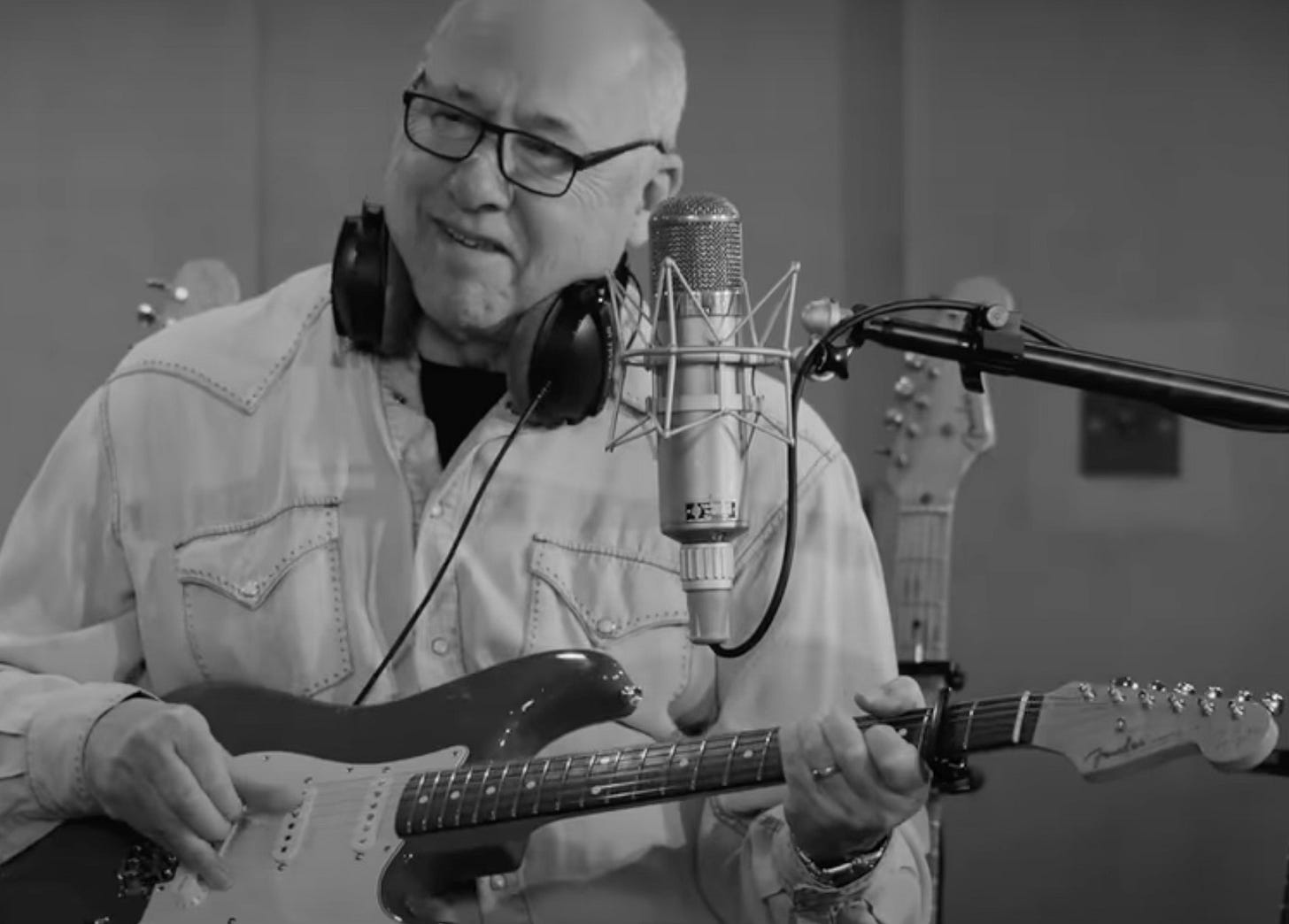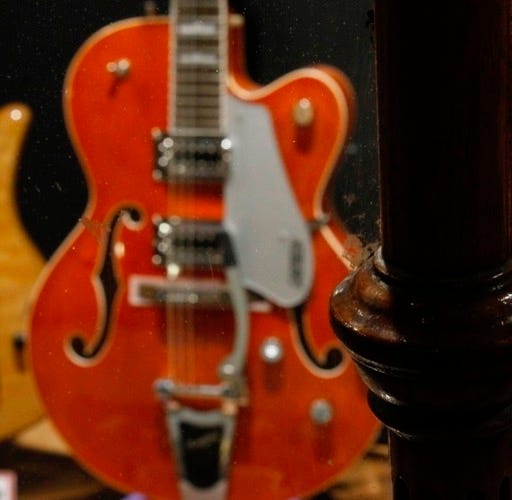Mark Knopfler’s songs can bring us home or set us sailing. They are signposts for the way ahead or waymarkers for our return. It’s no coincidence then, that Knopfler’s most enduring theme song, used for everything from funerals to football matches, is called “Going Home.”
[All quotes are taken from sources referenced at the end]
Where the Tyne meets the Delta
Mark’s musical journey, from the River Tyne to the Mississippi Delta and back, began when as a small child his mother found him listening intensely to songs such as The Big Rock Candy Mountain and Rudolph the Red Nosed Reindeer on the radio. He progressed to boogie-woogie piano, an aborted bash at violin, an electric guitar his dad bought him, and borrowed battered old acoustic guitars. Scottish and Irish musical influences would sink in via his Glasgow-Newcastle roots: “Half of my ancestors are Scottish. On my mother's side, there are the Geordies from the north-east of England, but they are of Scottish descent. This Scottish influence that you hear in songs like Going Home for example, always came naturally to me.”
His connection with Newcastle and North East England is one of leaving to achieve success but returning to connect with his childhood: “You know, when you grow up in a city like Newcastle upon Tyne, at some point, you're going to leave that city and go to London. You have to leave the city to come back - and you have to come back to leave the city again…When I come back to Newcastle, I always go to the end of the last compartment and look across the bridge at the river. It just still has a lot of meaning for me.” Meanwhile, Northumberland still calls him home, “I still fantasize about having a little cottage up in the Tyne Valley, maybe somewhere up on the tops near Allendale or Whitfield where the views are out of this world.”
Rock and Roll Dreams
A Newcastle acquaintance of mine recalled meeting him in a friend’s bedroom, playing the same thing over and over again. Knopfler himself recounts: “I remember at 16 sitting up all night trying to play the guitar, driving my poor parents nuts. They were begging me to go to bed, to stop banging my foot on the floor. In my head, I had already left school, and I was playing guitar on stage.” Steve Phillips remembers, “Mark was already a very capable guitarist at eighteen or nineteen, way above the norm,” Knopfler himself speaks of the teenage years that make an indelible musical impression on us: “The dreams of a teenage kid have always been the fuel. That’s the whole thing that keeps you going.”
It was either a crystal-clear sounding CD or a worn-out chrome cassette of Dire Straits Brothers in Arms that started the rock-roots leg of my teenage musical education. Slipping the silvery CD into the slot and feeling the bass and side cymbal punch of So Far Away was equivalent to launching off to an imaginary planet. Back on planet Earth a holiday on the ‘Costa del magnifiquo’ was dominated by the sound of the sea mixing with the hiss of cassette tape as I carefully dissected the credit notes of Brother’s in Arms. Who was this guy who wrote sophisticated American-sounding songs and who signed himself off with the initials MK? He was a dweller on the threshold of the rock-god realms. Back then it was inconceivable that this thoughtful, clever, singer-songwriting guitarist could come from my hometown, that he was a Geordie. That dawning realization would slowly emerge following later explorations of Dire Straits’s back catalogue, but for now, a video cassette of Alchemy Live would levitate my world, via the roller coaster rides of MK’s guitar solos.
I once met Mark after a Notting Hillbillies gig at Newcastle City Hall, and, heavily influenced by the comments of fans in his parody song Badges, Posters, Stickers and T-Shirts, I cockily said: “I haven’t come for your autograph, I just want to thank you for your music.” He grinned from ear to ear. As a typically cheeky Geordie, I proceeded to dig a deeper hole for myself by offhandedly complimenting his manager turned drummer Ed Bicknell: “You’re getting good,” I said, “You must have been practicing, have you?” If I’m not mistaken, they all grinned at that too.
Doing America
Like others my personal journey meshes with Knopfler’s through the love of music and North-East England; the joys of the English language and History; and the practice of Journalism and Teaching. His journey from Newcastle to Essex, to Leeds, to London, and onto the world followed a musical muse I would often find myself following in similar, less distinguished footsteps. Like me, a turning point for him was an early trip to the United States. Mark recalled: “By the time I got to America, I was on a Greyhound bus ticket and not a lot else, just a shoulder bag. That was in ’76. I was really excited about getting there at last, especially with the music, and not just because I was a complete blues nut. I was really into folk music, but I was more aware that Irish Scottish, and English folk songs had gone to America and come back. This interaction between the continents always interested me, even from the first songs I was writing in trying to make a parallel.”
Knopfler determined to add his own geography to the songs that were starting to push hard: “Going down from Newcastle to London is going south and going south in America was the mythical thing. That was always calling to me. I was interested in imposing some of my own geography onto the music, from a song like ‘Southbound Again’ on the first album all the way over to ‘Fare Thee Well Northumberland’ on The Ragpicker’s Dream.” Knopfler embellishes on his affection for America: “It wasn't because of Hollywood. It was because of rock & roll music, more than anything. I've always felt an affinity with America, Americans. It's because America's made up of Everyman - in some ways I feel as though I'm made up of a little bit of Everyman, too.”
Interviews with Knoplfer in Q magazine piqued my curiosity, setting up dreams of my own exploration of the USA. I noted his influences, be they books, albums, or musicians and added them to my own. My first journey over the Atlantic would follow the development of American music up the Mississippi from New Orleans to Chicago, via Memphis. Thanks to the inspiration of the DJ Andy Kershaw, I recorded everything along the way on a stereo cassette recorder. I was probably paying homage to the very same musicians Knopfler had before me: Boogie Woogie Piano players, New Orleans Jazzmen, Elvis Presley, Muddy Waters, BB. King, and country via The Nitty Gritty Dirt Band, Dylan’s Nashville Skyline, Hank Williams, and an obscure album of Appalachian Mountain Music.
(My memories of that period are crystal clear: a New York Saxophone Playing Take the A Train on the Street; an old lady playing stride piano from a wheelchair in Preservation Hall, New Orleans; two guys playing Buddy Holly and Eddy Cochran in a Memphis Café; trad and cajun bands on the banks of the mighty Mississippi; meeting Jazz pianist Abdhulla Ibrahim in Sweet Basil Cafe, Greenwich Village, New York)
Completing the Circle
Knopfler’s sessions with other musicians have opened doors to whole other musical worlds too, most especially to Bob Dylan and Van Morrison, people he dreamed he’d work with, then did. Dylan once said, “You can be in my dream if I can be in yours,” and Knopfler took up the offer: “It seemed so impossible. I’d go City Hall and I’d see Van Morrison and think, I so wish I was doing that. Or Dylan and the Band somewhere. You’d reserve a place in that line-up for yourself.” A glass-half-full type of person interviews with MK reveals him to be a man who talks about life and art from a deeply creative perspective. At heart his humble manner suggests he’s not doing it for the fame, but because he’s obsessed, he loves the creative process of writing, recording, and playing. With a twinkle in the eye Knopfler often quips that he, “recommends success to anyone,” yet simultaneously he asks those who enquire if there is a single thing to be recommended about fame…
Knoplfer’s journey is all about completing the circle, about achieving childhood dreams, about the growth of one happy boy into one ‘lucky’ man. That’s the force of the American dream permeating the British psyche: everyone gets their Time In The Sun he tells us, and Good On You Son for giving it a go.
References
Brandstetter, M. (2024, June 10). A conversation with Mark Knopfler:
“The Tyne bridge is the perfect symbol for my life”. Hyperlocrian.com. https://www.hyperlocrian.com/post/a-conversation-with-mark-knopfler
Flanagan, B. (1986). Written in my Soul: Rock’s great songwriters talk about creating their music. https://ci.nii.ac.jp/ncid/BB13582329
Graham, J. (2019, February 6). Mark Knopfler: ‘I’ve been tested, but the desire to make music has remained’ Big Issue. https://www.bigissue.com/culture/music/mark-knopfler-ive-been-tested-but-the-desire-to-make-music-has-remained/
One Deep River - Mark Knopfler. (2024, June 4). Mark Knopfler. https://www.markknopfler.com/biography/
Rees, P. (2015, April 17). Sultans of Swing: The Untold Story of Dire Straits. Louder. https://www.loudersound.com/features/sultans-of-swing-the-untold-story-of-dire-straits
Sexton, P. (2018, August 12). From the Tyne to the Delta: The travels of Mark Knopfler. uDiscover Music. https://www.udiscovermusic.com/stories/tyne-delta-travels-mark-knopfler/
Sexton, P. (2024, April 8). Dire Straits’ Mark Knopfler: ‘Our hits didn’t all come out the way I wanted.’ The Sunday Times. https://www.thetimes.com/culture/music/article/mark-knopfler-our-hits-didnt-all-come-out-the-way-i-wanted-5fqw5zw89







